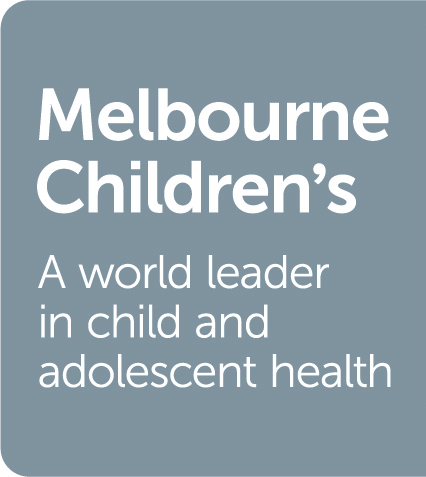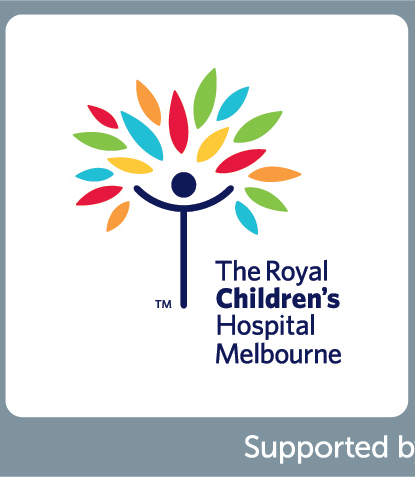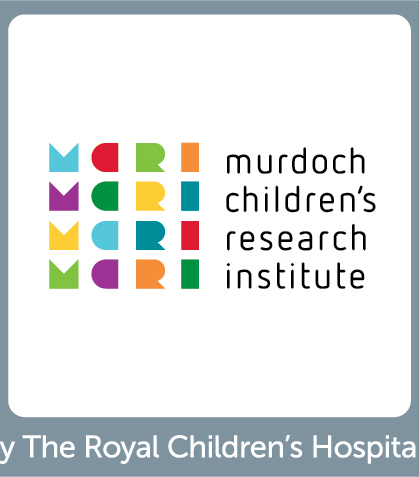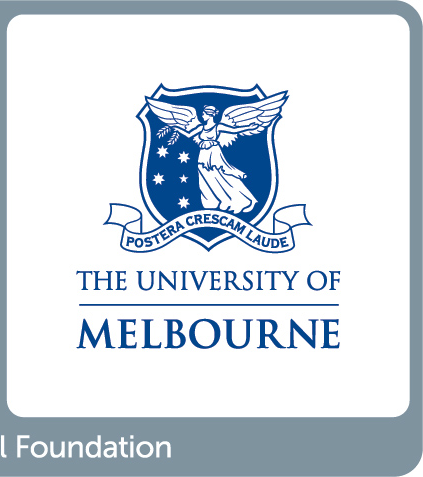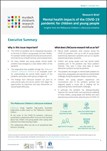The COVID-19 Response
COVID-19 research response
COVID-19 research emerged as a key area of focus and collaboration for LifeCourse, the Melbourne Children’s Campus and our cohorts in 2020.
As part of the larger Melbourne Children’s response, LifeCourse facilitated the collection of additional COVID-related data from LifeCourse cohorts.
These data provide a unique opportunity to understand how pre-pandemic experiences shape risk and resilience for children and young people during the crisis, and in the long-term aftermath.
About the available data
At the onset of the COVID-19 pandemic, LifeCourse coordinated a collaborative effort to ensure that our existing high-quality longitudinal studies were leveraged to understand how children, young people and their families were coping during this time. This included facilitating the use of shared tools and approaches, including the Coronavirus Health and Impact Survey (CRISIS)1, which allowed researchers to collect comparable data across the cohorts.
This collaborative effort has led to the creation of an exceptional data resource (Table 1) which includes data collected both before, during, and in the aftermath of the pandemic for more than 6000 infants, children and young people, from 0-24 years of age.
This data also includes factors that may have influenced their psychosocial health during this period, such as their social relationships, daily life, family wellbeing and community environment. Researchers can explore the available data and submit a data access request at lifecourse.melbournechildrens.com/data-access/.
Table 1. LifeCourse cohorts with data on the psychosocial impacts of COVID-19 on children and young people. Explore the data available at lifecourse.melbournechildrens.com
| Cohort name | Description | Year established | No. of years study was running pre-COVID | No. of waves of data collection pre-COVID | Number of children and young people in COVID data collection | Age at COVID data collection |
|---|---|---|---|---|---|---|
| ATP Generation 3 Study (ATPG3) | Multi-generational population-based study of social-emotional development from infancy to adulthood | 1983 | 37 | 2 | 1167 | 1-11 years |
| Barwon Infant Study (BIS) | Population-based study of pre-birth and early life origins of non-communicable diseases in the modern environment | 2010 | 10 | 11 | 850 | 7-9 years |
| Childhood to Adolescence Transition Study (CATS) | Study of the transition through adolescence | 2012 | 8 | 8 | 1084 | 16-18 years |
| HealthNuts * | Population-based study of food allergy | 2007 | 13 | 4 | 418 | 10-15 years |
| Melbourne Infant Study: BCG for Allergy and Infection Reduction (MIS BAIR) * | Clinical trial on the effect of neonatal tuberculosis vaccination on allergies and immune development | 2013 | 7 | 16 | 315 | 5-7 years |
| Mothers' and Young People's Study (MYPS) | Population-based study on first-time mothers and their firstborn children | 2003 | 17 | 15 | 407 | 14-17 years |
| Peri/post-natal Epigenetic Twins Study (PETS) | Study of twins from pre-birth | 2007 | 13 | 7 | In Progress | 11 years |
| right@home | Community trial on the effect of nurse home visiting for mothers experiencing adversity | 2013 | 7 | 16 | 319 | 6-7 years |
| SchoolNuts * | Population-based study of food allergy | 2014 | 6 | 2 | 238 | 15-24 years |
| Triple B: The Triple B Pregnancy Cohort Study (Bumps, Babies and Beyond) | Population-based study on the impact of pregnancy behaviours on infant development | 2009 | 11 | 8 | 429 | 8 years |
| VicCHILD: Victorian Childhood Hearing Impairment Longitudinal Databank | A register and research databank of children born with permanent hearing loss | 2012 | 8 | 4 | 497 | 0-19 years |
| VITALITY: Primary prevention of infant food allergy: a randomised controlled trial of postnatal vitamin D supplementation * | Clinical trial on vitamin D supplements to prevent infant food allergy | 2014 | 6 | 8 | 377 | 1-6 years |
| TOTAL | 126 total pre-pandemic calendar years captured | 101 total waves of pre-pandemic data collection | COVID experiences captured for a total of 6101 children and young people | Together captures the COVID experiences of infants through to young adults (0‑24 year olds) |
This table reflects those LifeCourse cohorts with data on psychosocial wellbeing collected during the COVID-19 pandemic for children and young people (up to 25 years), as of December 2021. Other LifeCourse cohorts may include or in future collect data relevant to COVID-19 beyond this scope. For further information and updates since the time of publication see https://lifecourse.melbournechildrens.com/.
* COVID wave assessment collected concurrently as part of the COVID Immune study.
Insights to date
The Melbourne Children’s LifeCourse initiative has played a key role in understanding the mental health impacts of the COVID-19 pandemic on children and young people, by facilitating a coordinated and collaborative effort to generate data from multiple high-quality longitudinal studies which were established prior to the pandemic.
Analysing this data has shown us that for children and young people with a history of mental health difficulties, the pandemic exacerbated these difficulties. Furthermore, one in five children without a history of mental health difficulties experienced them for the first time during the pandemic. We also know that certain factors such as family wellbeing and social and emotional skills appear to have played a protective role. A more comprehensive overview of these risk and protective factors can be seen in Table 2.
Table 2. Risk and protective factors identified by LifeCourse studies to date.
| Individual-level | Family-level | Community-level | |
|---|---|---|---|
| Risk factors |
|
|
|
| Protective factors |
|
|
|
Where to next?
Data from the LifeCourse studies will continue to be an ongoing resource for researchers to address mental health challenges and promote recovery in the post-pandemic period. For example, there is still work to be done to understand the potential for resilience pathways, including how mental health may improve as life returns to normal for children and young people.
In the meantime, insights from our studies to date strongly suggest the need for mental health supports that reach those most in need, including children, young people and families who had pre-existing risks prior to the pandemic. Strategies to promote mental health will also require investment in prevention and promotion approaches across the family and community contexts in which children live, play and grow.18,19
References
- Nikolaidis A, Paksarian D, Alexander L, et al. The Coronavirus Health and Impact Survey (CRISIS) reveals reproducible correlates of pandemic-related mood states across the Atlantic. medRxiv. 2020.
- O'Connor M, Lange K, Downes M, et al. Impacts of the Australian COVID-19 pandemic restrictions on children and young people with pre-existing special health care needs. In preparation
- Fogarty A, Brown S, Gartland D, et al. Psychosocial factors associated with adolescent depressive and anxiety symptoms during the COVID-19 pandemic. International Journal of Behavioral Development. 2022;46(4):308-319.
- Loughman A, Hedley J, Olsson CA, et al. Increased maternal mental health burden in a representative longitudinal community cohort coinciding with COVID-19 lockdown. Australian Journal of Psychology. 2021;73(4):578-585.
- FitzPatrick KM, Gartland D, Fogarty A, Brown S. Mothers’ and Young People’s Study Policy Brief #5: Impacts of the COVID-19 pandemic on maternal mental health & wellbeing. Melbourne, Australia: Murdoch Children’s Research Institute;2022.
- Letcher P, Greenwood CJ, Macdonald JA, et al. Life Course Psychosocial Precursors of Parent Mental Health Resilience During the COVID-19 Pandemic: A Four-Decade Prospective Cohort Study. Submitted to Journal of Affective Disorders. 2022.
- McLean K, O'Connor M, Erbasi E, et al. Distribution of child abuse and neglect risk factors prior to and during the early stages of the COVID-19 pandemic. in preparation.
- O'Connor M, Lange K, Downes M, et al. Impacts of the COVID-19 pandemic for Australian children and young people with varying health and social needs. In preparation.
- O'Connor M, Greenwood CJ, Letcher P, et al. Inequalities in the distribution of COVID-19-related financial difficulties for Australian families with young children. Child: Care, Health and Development. 2022:1-12.
- Canterford L, Beatson R, Dashti S, Phillips E, Patton G, Mundy L. Student mental health and school-led remote learning experiences during the COVID-19 pandemic. Canberra: Australian Department of Education, Skills and Employment;In preparation.
- Mundy LK, Canterford L, Dashti SG, et al. Adolescent mental health and wellbeing in the COVID-19 pandemic: a prospective population-based study of the effects of government mandates and school closures. Submitted to Australian Journal of Social Issues. 2022.
- Giallo R, Fogarty A, Gartland D, Savopoulos P, FitzPatrick KM, Brown S. Adolescents' experiences of remote schooling and family life during the COVID-19 pandemic in Australia. Submitted to Journal of Child and Family Studies. 2022.
- Jefferies P, McGarrigle L, Ungar M. The CYRM-R: A Rasch-validated revision of the child and youth resilience measure. Journal of Evidence-Based Social Work. 2019;16(1):70-92.
- O'Connor M, Arnup S, Goldfeld S, et al. Natural history of mental health competence from childhood to adolescence. Journal of Epidemiology and Community Health. 2021.
- O'Connor et al. Did pre-pandemic mental health competence shape risk and resilience during the earlier and later phases of the COVID-19 pandemic? in preparation.
- Biden EJ, Greenwood CJ, Macdonald JA, et al. Preparing for Future Adversities: Lessons From the COVID-19 Pandemic in Australia for Promoting Relational Resilience in Families. Frontiers in Psychiatry. 2021;12(1319).
- Fogarty A, Giallo R, Gartland D, Mensah F, Brown S. Mothers’ and Young People’s Study Policy Brief #3: Young people’s experiences of the COVID-19 pandemic. Melbourne, Australia: Murdoch Children’s Research Institute;2021.
- Jorm AF. Why hasn’t the mental health of Australians improved? The need for a national prevention strategy. Australian & New Zealand Journal of Psychiatry. 2014;48(9):795-801.
- de Figueiredo CS, Sandre PC, Portugal LCL, et al. COVID-19 pandemic impact on children and adolescents' mental health: Biological, environmental, and social factors. Progress in Neuro-Psychopharmacology & Biological Psychiatry. 2021;106:110171.
